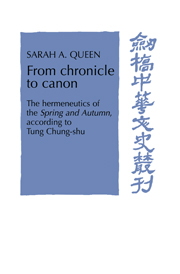Book contents
- Frontmatter
- Contents
- List of tables
- Acknowledgments
- List of abbreviations
- 1 Introduction
- PART I Three perspectives on the authenticity of the Ch'un-ch'iu fan-lu
- 2 A biography of Tung Chung-shu
- 3 A history of Tung Chung-shu's literary corpus
- 4 The authorship of the Ch'un-ch'iu fan-lu
- PART II Exegesis and canonization
- Appendix 1 The birth and death dates of Tung Chung-shu
- Appendix 2 The dates of the Han-shu 56 memorials
- Appendix 3 Han transmission of Kung-yang learning
- Appendix 4 Han dynasty disciples of Tung Chung-shu
- Appendix 5 Citations and titles attributed to Tung Chung-shu
- Appendix 6 Transmission of Ch'un-ch'iu fan-lu editions
- Selected bibliography
- Index
2 - A biography of Tung Chung-shu
Published online by Cambridge University Press: 10 December 2009
- Frontmatter
- Contents
- List of tables
- Acknowledgments
- List of abbreviations
- 1 Introduction
- PART I Three perspectives on the authenticity of the Ch'un-ch'iu fan-lu
- 2 A biography of Tung Chung-shu
- 3 A history of Tung Chung-shu's literary corpus
- 4 The authorship of the Ch'un-ch'iu fan-lu
- PART II Exegesis and canonization
- Appendix 1 The birth and death dates of Tung Chung-shu
- Appendix 2 The dates of the Han-shu 56 memorials
- Appendix 3 Han transmission of Kung-yang learning
- Appendix 4 Han dynasty disciples of Tung Chung-shu
- Appendix 5 Citations and titles attributed to Tung Chung-shu
- Appendix 6 Transmission of Ch'un-ch'iu fan-lu editions
- Selected bibliography
- Index
Summary
The Ch'un-ch'iu fan-lu is one of the more problematic texts surviving from China's medieval period. The Han-shu ‘Bibliographic Treatise’ lists a Tung Chung-shu in 123 bundles and a Kung-yang Tung Chung-shu chih-yü (The Kung-yang [Scholar] Tung Chung-shu Judges Cases) in 16 bundles, and the Shih-chi (Records of the Historian) ‘Biography of the Confucian Scholars’ mentions a Tsai-i chih chi (Records of Disasters and Anomalies). Yet references to a Ch 'un-ch'iu fan-lu do not appear in any books or fragments surviving from the Han dynasty. The text's earliest reference dates to the Liang dynasty (502–557 c.e.). From the Sung dynasty (960–1279 C.E.) onward, a long list of Chinese luminaries have vehemently attacked, cautiously doubted, or devoutly defended the text's authenticity. In the twentieth century, a handful of Japanese scholars also began to note problems with the text.
Some time between the third and sixth centuries an unknown figure probably compiled the Ch'un-ch'iu fan-lu from what survived of the Tung Chung-shu and other works by Tung Chung-shu that had circulated as separate items during the Han. These authentic writings were composed under diverse circumstances and at different times during the course of Tung's long official career. Thus, although Tung certainly composed parts of the received Ch'un-ch'iu fan-lu, he did not write it as a single work as it is now constituted. The text also includes materials not written by Tung.
- Type
- Chapter
- Information
- From Chronicle to CanonThe Hermeneutics of the Spring and Autumn according to Tung Chung-shu, pp. 13 - 38Publisher: Cambridge University PressPrint publication year: 1996



